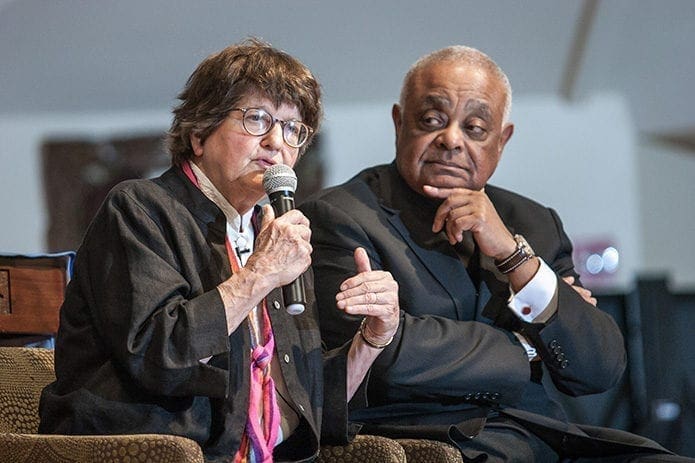 Photo by Thomas Spink
Photo by Thomas SpinkAtlanta
Sister Helen Prejean carried by the ‘current’ of her vocation
By ANDREW NELSON, Staff Writer | Published March 8, 2018
ATLANTA—For more than a generation, Sister Helen Prejean, CSJ, has been the face of the anti-death penalty movement. Undaunted by her years of advocacy, it is a path she’s committed to pursuing.
There is “a moral imperative not to walk away,” said the author of the best-seller, “Dead Man Walking: An Eyewitness Account of the Death Penalty in the United States.”
Growing up the daughter of an attorney in Baton Rouge, Louisiana, she had the good life in the 1950s. She had two siblings in a loving family. Her faith was fed by the kindly sisters at her Catholic schools.
“We loved being with them on the bus trips when we went on basketball games and we’d be singing these songs. Then we’d all be quiet for a half hour so the nuns could do their meditation,” she said.
Religious life seemed well suited for her.
“For me, I wanted the life, so at 18 I joined the sisters and I’ve never turned back from that,” she said.
Her late sister made Sister Helen’s first night in the novitiate memorable. Hidden among her clothes was rice—and lots of it. As she unpacked, it spilled to cover the bedroom floor. Since rice would never be tossed at her wedding, Sister Helen said her sister pulled the prank on a future “bride of Christ.”
Sister Helen smiled as she told the story. She was one of 18 young women to enter the religious community that year.
“A vocation is like a boat that catches a current, and it’s a current that keeps carrying you,” said Sister Helen, who is 78.
To walk the streets of Catholic-rich New Orleans in the habit as a member of the St. Joseph of Medaille gave her authority. The community is now known as the Congregation of St. Joseph.
“When you put the habit on, you were a somebody,” she said.
Early in her novitiate, she rode a bus when a woman knelt at her feet, kissed the cross on her rosary and asked for prayers.
“It made you feel very special,” said Sister Prejean, sipping a cup of tea with milk and sugar. She visited Atlanta recently as the headliner for a Feb. 15 panel on the death penalty at Holy Innocents’ Episcopal Church. A crucifix hung around her neck.
In that semi-cloistered novitiate, she fostered a spiritual life, along with “developing charity, developing love.” For Sister Helen, the silence was rewarding.
“The silence helped shape me. It was a paced life,” she said.
She entered the community in 1957 and made her perpetual vows in 1965.
“It was like an unfolding of a rose. For me, it was natural,” she said in her soft Louisiana accent.
That life lasted through the era of the Second Vatican Council. Spurred by the council’s call for renewal, the congregation examined its roots to ensure its ministry was true to the vision of its 17th-century founders.
Street clothes replaced the habit. Sister Helen said her community felt the traditional clothing separated the sisters from people they were called to serve. Sisters turned their focus to looking at the world through the prism of the life of Jesus.
Sisters asked questions that refocucsed the community’s life: Who was poor and why? Where was God? How could the sisters serve the poor? These discussions transformed her.
She left her ministry working as a religious director in a suburban parish. It was too unconnected to the lives of poor people. She ended up working in a poor neighborhood of New Orleans, serving women, men and families in a public housing project. And those people showed her a life of joy and suffering, she said.
“I have to shed my privilege. People taught me,” she said. “The real spiritual life of a Christian is the fire of Jesus, that love, to get in there with people who don’t have a voice.”
Then a woman asked if she’d be a pen pal to a death row inmate. Sister Helen agreed to exchange letters. It changed her life.
For a nun who envisioned a life teaching, it has been transforming—a bestselling book turned into a movie, with actor Susan Sarandon playing Sister Helen and winning an Academy Award. An opera based on the book has opened on stages across the globe. The opera is to be performed in Atlanta in 2019.
She just finished writing her third book, “River of Fire,” a prequel to “Dead Man Walking.”
Serving as a religious sister has made Sister Helen a “free agent of the Gospel.”
“It’s all for the service of the Gospel. The story is bigger than me,” she said.